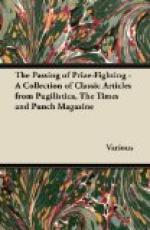As a retort, “Yah! German!” is, I am told, already considered vieux jeu by the wits of the pavement. But Ulstermen and Nationalists still think it effective to twit one another with having been supplied with rifles from the arsenals of the Bosch. They bandied charges and contradictions so vigorously this afternoon that the SPEAKER had to intervene to put an end to these “nonsensical bickerings.”
The SECRETARY OP THE TREASURY scouted the suggestion that County cricket-matches should be exempted from the entertainment tax. It is believed that his answer was based solely upon financial considerations, and that he must not be held to have expressed the opinion that first-class cricket, as played by certain counties, is, in point of fact, entertaining.
* * * * *
“German residents in South-west Africa have forwarded the Administrator a petition for transmission to President Wilson, claiming permission to erect a republic union with the Republic of Germany. The petitioners claim that they not only represent a majority of the white inhabitants, but interpret the views of the wishes of the majority of the majority of the ahmbahmbahmbah natives.”
New Zealand Paper.
We should like to know more of this remarkable tribe, which, inter alia, seems to have evolved a new method of proportional representation.
* * * * *
THE RED WINE OF THE COUNTRY.
“Did I iver tell ye,” asked ex-Sergeant O’Reilly, filling his pipe from my tobacco-jar, “about the red wine?”
“I remember a story about sparkling Burgundy,” I said.
“Och, that wouldn’t be it at all. ’Twas another time altogither.”
“Well,” I said, “tell me about the red wine.”
“’Twas this way.” O’Reilly leant back in his chair, covered his maimed hand with a pocket-handkerchief—a curious way he had—and looked at me with that expression of openness and simplicity which demands confidence. “We was ‘way back o’ the line at the time, at a place where ye’d expect to get a taste o’ rest; but what wid fancy attacks an’ ‘special coorses’ (thim ‘s the divil an’ all!) there wasn’t enough rest for an honest man to get into mischief. Well, there was to be a grand inshpection by a tremenjus brass-hat, one o’ thim soort all over ribbons that rides wid a shtiff back. ‘Twas the mornin’ before the great day whin the O.C. comes to me all of a flutter, an’ says he, ‘Sergint, ye’ve a chanct now to do me a good turn.’
“‘I’ll do it, Sorr,’ says I, ‘if it costs me my shtripes.’
“‘The fact is,’ says he, ‘we’ve run out o’ claret, an’ there’s no dacent shtuff to be had for twinty miles round; annyway, that’s what I’m tould. Now the Gin’ral has a great fancy for red wine.’
“‘’Tis a sad business,’ says I.
“‘I’ve heard it whispered,’ says the poor man, an’ he wid the D.S.O. an’ all, ‘that where there’s a good dhrop o’ dhrink you’re the man to find it. An’,’ says he, ’there’s no discredit to ye in that, O’Reilly.’




